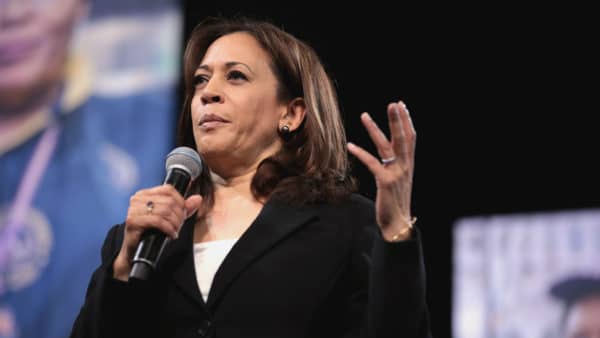Sen. Kamala Harris Questions Whether America Would Elect a Woman of Color as President
Beatrice Peterson, ABC News, November 16, 2019

Kamala Harris
In May, Sen. Kamala Harris stood before the largest chapter of the NAACP and focused her remarks around one subject: electability.
Five months later, Harris would call the issue of her electability the “elephant in the room” during an interview with Axios.
Harris, a woman who is both black and Indian American, wondered aloud if “America was ready for a woman and a woman of color to be president of the United States of America.”
It is an issue she has brought up on the campaign trail as well, questioning whether her race and gender might be a hindrance to her presidential bid amid the largest group of major contenders the Democratic party has ever seen — a field that includes an openly gay mayor, a Hindu Pacific Islander congresswoman, an African American senator, a Latino former cabinet secretary, and an Asian American businessman.
{snip}
Leah Wright Rigueur, an assistant professor of public policy at Harvard’s Kennedy School of Government, told ABC News that for “most of the country. . . gender is not a hindrance to people voting for a political candidate.”
On the other hand, she said, “there are elements of sexism, or unique challenges that female candidates face, that male candidates do not.”
Nevertheless, Wright Rigueur noted that black women often do well when they run for office “because they have the ability to unite disparate coalitions into alliances that end up propelling them into office. So you might call them unifiers — they’re very good at unifying various coalitions.”
In a CNN/SSRS poll conducted Oct. 17-20, Harris polled at 6% among white and 6% among non-white voters asked which Democratic presidential candidate they would be most likely to support.
{snip}
Democratic strategist Atima Omara says there’s been a shift in the electorate since the 2016 election. Omara says she’s seen more people willing to consider women of color because voters “realize these women represent a very strong base in the Democratic Party. I do see more receptiveness in the electorate, where there definitely would not have been pre-2016.”
And still, she said, many women of color have to deal with attacks based on outdated stereotypes.
Omara points to former Georgia gubernatorial candidate Stacey Abrams as a high-profile candidate who has been able to overcome many of those challenges, saying, “she’s been able to build her political career by being authentic and actually leaning into a lot of who she is.”
{snip}
In late October, Harris announced that she would be cutting some staff and moving staff from several primary states, including New Hampshire, to Iowa in an “organizational realignment to go all-in on Iowa.”
{snip}
“It can’t simply be that she is a black woman,” said Wright Rigueur, pointing to Harris’ struggles in places where she should be polling well, such as her home state of California.
{snip}
Alicia Jones, a Howard University alumna, told ABC News shortly after Harris’ comments to Biden on busing “I felt like it was politicizing. . . And so at that point, that took the smart person who I thought she was and took it down a couple of notches.
Jones, who hasn’t finalized her choice for the Democratic primary, told ABC News that race doesn’t play a factor in how she chooses to vote.
“Don’t think that I’m a vote for you just because you’re black,” she said. “I didn’t vote for Barack Obama just because he was black. I voted for him because he was smart.”
{snip}















